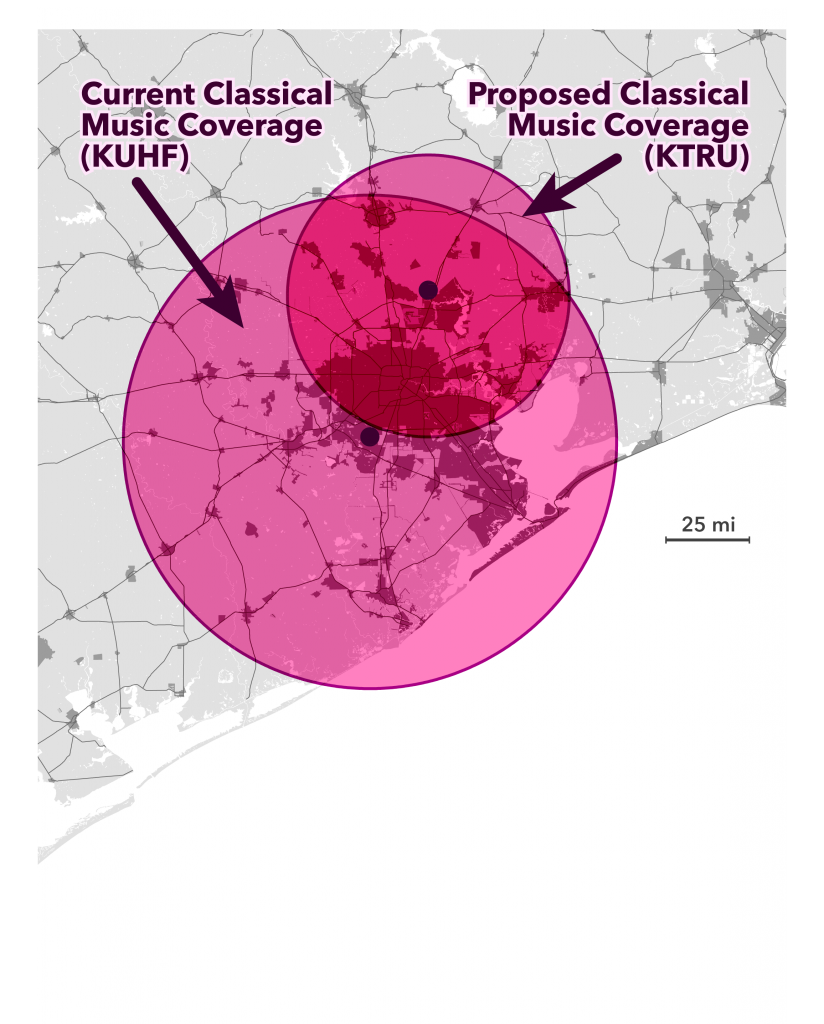“Shocking though this deal’s shameful genesis is, what’s worse is the proposed sale’s fundamental divergence from the best interests of the students, alumni and the greater Houston community.”
“We call on the University of Houston and Rice University to stop this sale, and maintain KTRU in its existing form as a student-run radio station at its rightful place, 91.7 on the FM dial.”
Archive for August, 2010
Houston Chronicle: Alumni Op/Ed opposes KTRU sale
Houston Press: Photos from last night’s Local Show
Contribute to save KTRU
Please donate to the Save KTRU fund. All monies will be used to publicize our cause and fund legal representation as we work to stop the sale of KTRU’s FM frequency, license, and tower to KUHF. You can donate by check, made out to “Save KTRU” and sent to:
Save KTRU, PO Box 130148, Houston, TX 77019
You can also donate via PayPal. PayPal takes 2.9% + $.30 for every donation, so if you are giving a significant donation, please consider writing a check.
From Rice Alum and former KTRU Jazz Director Syd Polk
My first memories of KTRU were of the Jazz Show (running every Sunday from 1974 to present!). KUHF, the local NPR affilicate (and the buyer of KTRU now) was a jazz station, but they played a fairly narrow, safe range of jazz. I used to listed to KUHF in the hours when they weren’t running All Things Considered and the like during the week, but on Sundays, I switched over to KTRU. As a budding jazz artist (never made it out of that stage!), KTRU blew my mind by playing Eric Dolphy, Brecker Brothers, John McGlaughlin, John Coltrane’s post-bop music, and the really strange stuff of Carla Bley, Pharoah Sanders, Sun Ra, etc. While I did not like all of it (and still don’t), it was great that I could turn on the radio to hear this stuff my teachers were telling me about at HSPVA.
When I went to Rice, my good friend Jeff Erickson was the Saturday 7-10 AM DJ. He talked to me about the radio, and I was irresistibly drawn to it. He took me to a staff meeting, and I was introduced to the jazz director. The show was going through a smooth jazz phase, but I immediately started playing stuff I liked. That spring, I was made Jazz Director. Alas, my first job was to let people go from the show who weren’t even playing smooth jazz.
That summer, the person who had been slated to be the classical director decided to quit, so they gave me both shows. Well, summers are tough at college radio, and I had no DJs. I did 6 hours of classical on Saturdays, and 7.5 hours of jazz. Was a long summer!
At the time, Houston had no classical radio station. That changed in the fall, when KUHF switched its music format to classical instead of jazz. We decided to drop KTRU’s classical show, but the jazz show became much more interesting. KTSU played some jazz, but once again, it was of the smooth jazz variety.
I convinced Kevin Long to come DJ for me that year. Together, we played a lot of modern jazz, as well as rebroadcasting Rice Jazz Band concerts (of which we were both members!). We started getting interesting records from the record companies again, as well as some ticket giveways.
The next year, I recruited Vince Kargatis as a DJ. We also had some fill-in work from Ann Marley. I am proud of the shows we put together; they were fun.
During all of this, I occasionally subbed for a regular DJ here and there. The playlist was a lot of stuff I had never heard of, and was not generally fond of (thanks, Ray Shea!), but there was some music in there which I really dug, that I would never have been exposed to otherwise.
Once Christmas, I was subbing for Jeff on Saturday, and was running the whole 7.5 hour show on Sunday. I arrived Saturday morning at 6:45, and the Rice Memorial Center was locked. However, there was a sign, and a long trunk of cables coming out of a window feeding to the vestibule of the Rice Chapel, where there was a hastily assembled studio with a portable turntable setup, and about 300-400 records. They were doing asbestos removal in the RMC, and never bothered to tell anybody, so the KTRU staff had about 30 minutes to set all of this up! They did not grab any jazz records, so on Sunday, I cycle through my entire collection of jazz records, which at the time, was about 12 discs. I repeated Giant Steps and Kind of Blue! It was freezing in there as well.
We were down the hall from Willy’s Pub at that point in time. One time, I was in the pub, and they had the radio on. Ray Shea was in the pub as well. At that point, we only had 3 Public Service Announcements on the queue, and one of them was about testicular cancer screening and MD Anderson. We were all really tired of that one, as it came up once every 3 hours! So, the poor DJ was reading this, and Ray yelled out as loud as he could something like “F*&( that s*(&!”, stormed to the radio, repeated the epithet on the air, and ripped the card off of its holder in mid-sentence. The DJ stammered something about “Well, uh, just call MD Anderson. Let’s play some music!”
The radio was a wonderful experience, and I am sad that current and future Rice students won’t get to participate in it. It was organic, eclectic, original, and a wealth of culture from slightly off-center. It reflected the student body well. I know it will be available online (at least for a while), but you know, getting that phone call from a lonely teenager asking you questions about the music, or an old teacher, or a musician visiting Houston putting in a request… Those are things that are gone forever.
Syd Polk
Hanszen ’87, KTRU Jazz DJ winter 1983-1984; Jazz Director Spring 1984-Spring 1986
Houston Press: Artists show support for KTRU on Local Show
“Darwin’s Finches summed it up at the end of their show-capping performance: ‘If KTRU goes off the air, we won’t eat.’ It was just one of many statements made in support of the storied radio station that started off in a dorm room some 43 years ago, and we’re certain it won’t be the last.”
Coverage of KTRU vs. KUHF
 These circles show the broadcasting ranges of KUHF and KTRU. If you don’t currently receive KTRU, you won’t receive the proposed new all-classical station.
These circles show the broadcasting ranges of KUHF and KTRU. If you don’t currently receive KTRU, you won’t receive the proposed new all-classical station.
Image copyright Bill Rankin / www.radicalcartography.net
Burn Down Blog: Linda Thrane
“KTRU supporters are not opposing change for opposition sake. People are truly worried about the future of KTRU, and are demanding answers. Alas, most of the information seems to come from the Houston Press. How can anyone support a change about which they know nothing? Rice needs to justify this sale. “
From Alum Ellen Chenoweth
I was only a DJ at KTRU for one year, 2000-2001, and that’s probably a good thing. In my waking life I enjoyed my shift immensely, freely experimenting with genres and bands and poring over other people’s funny and insightful album reviews. But in one frequently occurring dream, I would see the counter with the remaining music seconds click down to zero, be unable to find any music to put on the air in time, and there would be the dreaded silence on the radio. 50,000 watts broadcast into the world mattered, and my subconscious wasn’t going to let me forget it!
Just as the best of my academic classes from Rice continue to influence my worldview, my two semesters at KTRU have been a rich vein of material that I’m still drawing from 10 years later. I’ve chosen to make my career in the arts and KTRU was influential in that decision, giving me hands-on experience with a fiercely grassroots cultural organization at just the right time.
People sometimes ask me what criticisms I have of Rice. My response usually centers around the insularity often present at the institution, the attitude subtly promulgated by the administration at the time I attended that students didn’t need to go beyond the hedges for anything, that everything we might want was no further than the next college over. KTRU was a compelling counterweight to this tendency, a powerful link to the larger Houston community, not just by reaching out to listeners driving the Houston streets, but by pulling Rice students out as well, encouraging them to explore new territory.
I’m deeply disappointed that the current administration would cut off a vibrant and historic Rice asset in such a nakedly crass maneuver. More than the withdrawal of my involvement in the alumni interview program or the withholding of my humble monetary contributions, I believe the greatest loss would be my lack of ability to be an ambassador for Rice. I would be forced to warn any promising youngster or prospective faculty member that I come into contact with that the university doesn’t seem to recognize its own best features.
Ellen Chenoweth, Sid ‘01
From Alum Sheila Hall
I wasn’t a KTRU dj but at least half of closest friends were. I appreciated what the radio station brought to the community and how my own musical tastes were kept fresh and evolving through my connections with KTRU and KTRU djs. After being in Chicago for 9 years, I’m moving back to Houston. I’m terribly scared about moving back there (the heat, living near my parents as an adult, new jobs). However– at the top of my list of positive things about moving back is: listening to KTRU on the car radio. Thanks to all of the djs and helpers who are trying to save KTRU so that I can experience this reality.
Sheila (Herman) Hall, Jones 2001
From Alum Vincent Kargatis
As with many alumni here, KTRU was a major part of my life while at Rice. As undergrad and grad student, I DJed for 8.5 years (1987-1995), and acted as Jazz Director 1990-95. I think most know or can imagine how involving a period that was, so I won’t spend time with anecdotes. I want to note instead how important KTRU was to me in a later endeavor of presenting concerts of jazz and experimental music.
After leaving Rice and moving to DC, I immediately missed the personal music advocacy that was the crux, I think, of the KTRU experience. That advocacy was perpetual with any KTRU shift, and for me peaked with helping produce the KTRU Avant-Jazz Fest in 1993. In DC I hooked up with a few people that likewise lamented the lack of adventurous improvised music in town and started Transparent Productions in 1997, a volunteer and unfunded organization dedicated to presenting musicians and giving them 100% of all proceeds, working on a zero budget.
Over the years I was personally involved in presenting over a hundred concerts, with every ticket dollar going to the artists, totaling probably close to $50,000 going straight into musicians’ pockets. That bottom line would not have happened without my KTRU experience, I’m sure of that.
Vincent Kargatis
Sid Rich 1989 / Space Physics & Astronomy 1996
Houston Press: KTRU Flap Inspires Downfall Parody, Uncle Charlie Poster
“Primo Houston poster artist Uncle Charlie has also printed up a batch of ‘Save KTRU’ posters, which…will be available for free at Sig’s Lagoon – remember, it’s in the ‘Wallpaper’ block of buildings across Winbern Street from the Continental Club now – starting Wednesday.”
The Daily Cougar: Rice students lose voice, UH gains little
“What will UH get out of this deal, other than a $9.5 million bill for a station and tower? In essence, KUHF 88.7 FM will switch to an all-news format and KTRU will be known as KUHC and broadcast the art scene and classical music. So in essence, nothing new. No jazz or alternative music station, no UH student broadcasting, nothing that KUHF wasn’t already giving us. Just a radio station looping NPR every 24 hours and a sister station broadcasting what KUHF had been broadcasting all along, sans news.”
The Daily Cougar: Radio sale riles Rice students
“Sunday afternoon brought blazing temperatures and a heated protest on the Rice University campus. Around 300 students, faculty and community members gathered in front of the William Marsh Rice statue in the university’s academic quadrangle to protest the sale of KTRU, the student-run radio station, to UH.”
From local musician Benjamin Wesley
From Alum Ray Shea
My first day of Freshman Week in 1982, I met my advisors and the first thing I asked them was, “How do I get to the radio station?” Computer science was the “official” reason I selected Rice, the academic reason, but deep down I have to admit KTRU was the thing that really sucked me in.
I still remember my first training session, with a sophomore named Ray Isle. Ray would later become a close friend and roommate, and these days he gets paid to drink wine on national TV at six in the morning, but back then he was exactly what I wanted to be: a KTRU DJ. He showed me how the board worked, how to play a cart, how to cue up a record. Then he gave me a turn to sit in the chair and try it out and asked if I had any requests. “Joy Division,” I said. “‘Love Will Tear Us Apart'”. I knew all about Joy Division since I was a voracious reader of music magazines, but I’d never actually heard them. He dug out the 7″ single and I put on the headphones, dropped the needle on and then spun the record backward til I found the beginning of the song, just like he showed me. He made a little small talk while we waited; I mostly sat there terrified, and then when the last song faded out, I pushed the levels up and pushed the green PROGRAM button, and the little Joy Division record began to spin and that thumping bass line came through the headphones and I grinned.
“That wasn’t too terrible,” Ray said, but I wasn’t listening.
This. Right here. This was it. Not the student paper. Not the band. Not soccer, or softball, or yearbook, or theatre, or politics.
This. This cramped, grotty little cluster of tacky wood-paneled rooms in the basement of the RMC, with the ancient analog equipment and the falling-apart headphones and the squeaky chair and the weird graffiti. And the music library. The enormous, glorious music library. I fell into those stacks like Augustus Gloop falling into Willy Wonka’s lake of chocolate. Cool, the Cramps! Look, the Velvet Underground! Wow, Mission of Burma, what’s that, are they good?
I was finally home.
KTRU was the driving force that would eventually propel me through six years and two college degrees. My best lifelong friends are all people I met at KTRU. And together we learned about music, about business, about media and promotions and organization and scheduling and budgeting. We learned how to deal with people, how to compromise and reach consensus. Sometimes we didn’t learn as well as we should have, but goddammit, we learned.
And somewhere in all that craziness, all those late nights drinking beer and listening to records and arguing about music, we accidentally participated in a movement. A movement that would permanently change the face of the music industry forever.
Michael Azerrad’s landmark book _Our Band Could Be Your Life: Scenes From the American Indie Underground, 1981-1991_, documents the rise of American punk and indie rock during the 1980’s, a musical movement that burst into the mainstream in 1992 with Nirvana’s “Smells Like Teen Spirit”. In its formative years, this movement, made up of a loose network of small record labels, innovative musicians, small press fanzines, and college and non-commercial radio stations, provided the breeding ground and the DIY ethic for a revolution in music that dominates the music industry to this day. In the last four decades only the rise of hip-hop has had anything close to the same effect.
And KTRU was there. Rice students, using their own talents, their own sweat equity, helped make it happen. KTRU was invaluable in helping this musical culture flourish in Texas.
Somewhere out there, in the heads of a bunch of passionate music-minded middle schooler and high schooler and undergrad kids’ heads, is the next musical revolution. And KTRU can still be on the leading edge of this innovation and progress, but only if they are still around to do so.
My great fear is that if KTRU’s 91.7FM frequency and broadcasting tower are stolen out from under them, it will result in the eventual slow death of the station. For many reasons already well-documented elsewhere on this site, an Internet-only radio station simply does not have the influence and resources necessary to survive as a self-perpetuating ecosystem. The loss of the frequency will essentially gut the station’s programming. And it breaks my heart that my two brilliant, talented, music-loving teenagers, both of whom up until last week were considering Rice as a possible college destination, may not get to experience what I experienced.
Not at Rice, anyway. If they want what I had (and they do), and if Rice continues on this ill-advised course of action, they’ll have to go to Stanford, or MIT, or Berkeley, or Tulane, or Carnegie-Mellon. And I intend to encourage them to do so.
Ray Shea
Sid Richardson 1986/88


